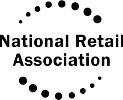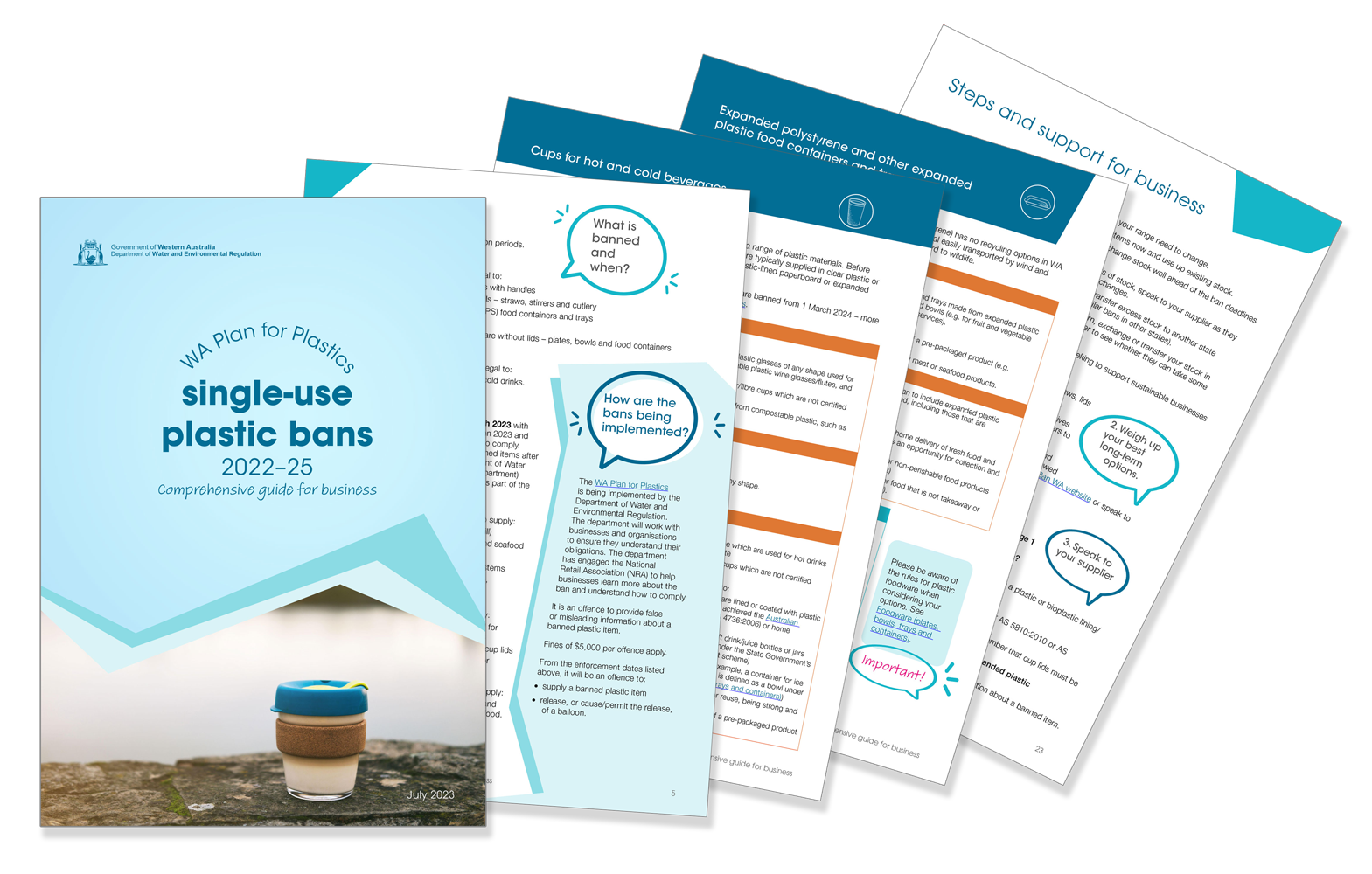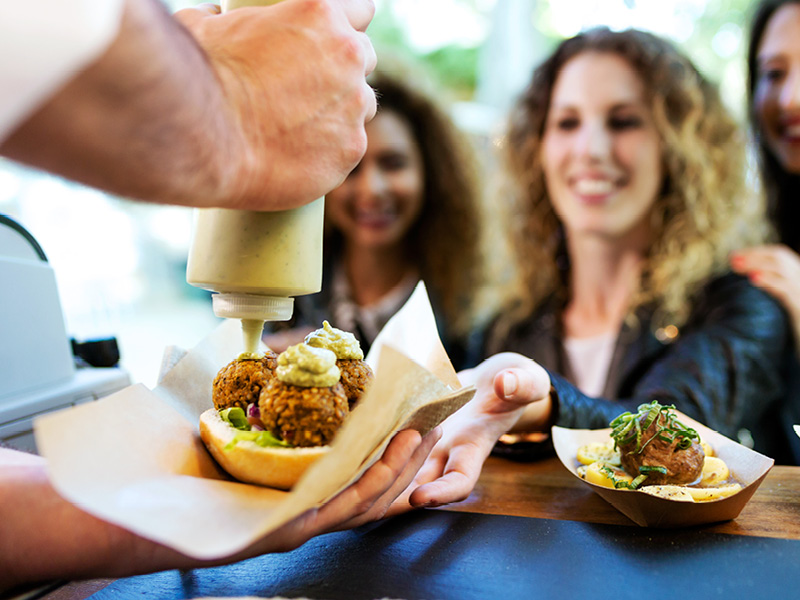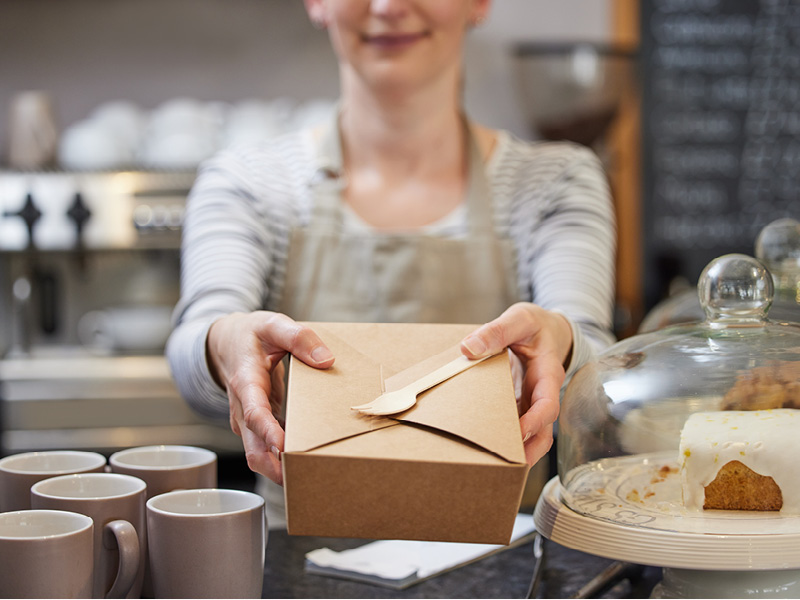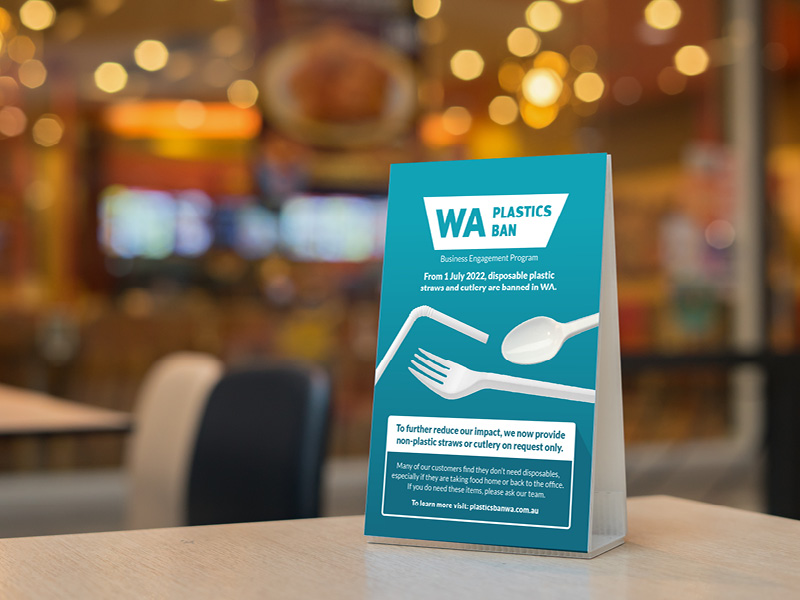About the Ban
Plastics have become a part of everyday life. They are inexpensive, convenient and used in many applications. However, many single‑use plastics either end up as litter or landfill.
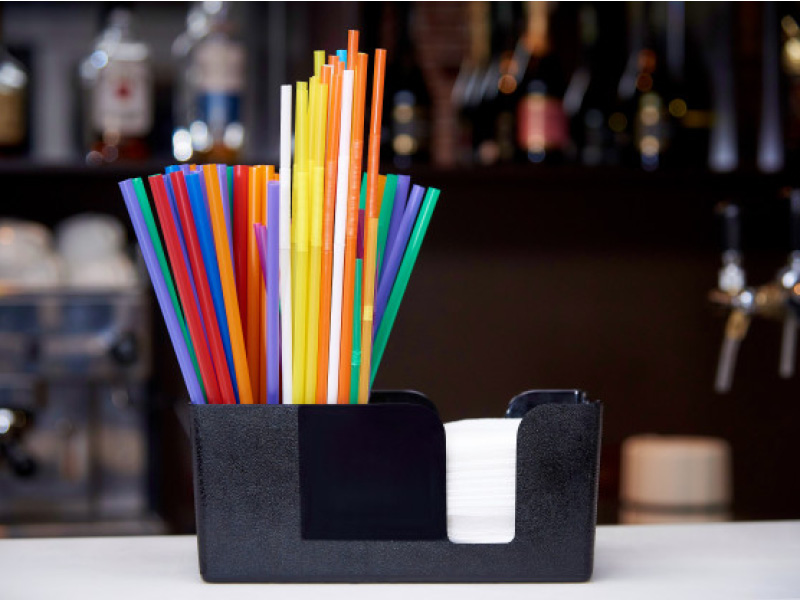
When littered, plastic items – including most compostable plastics - do not naturally biodegrade in the environment. They may persist for hundreds of years and eventually break up into fragments which can cause harm to the environment.
Single-use plastics also often end up in landfill because they are food contaminated or they cannot be economically sorted and recycled in current facilities.
The WA Government is implementing strategies to reduce the impacts of single-use plastics, including bans on problematic plastic items.
KEY INFORMATION
Why is the ban being introduced?
Plastics have become a part of everyday life. They are inexpensive, convenient and used in many applications across a range of industries. Many single use plastics either end up as litter or in landfill.
In 2019, the WA Government provided the opportunity for input on a range of items. The Government received over 9,400 submissions which indicated strong support for reducing the impacts of single-use plastics through a range of approaches including bans, product design, waste infrastructure, and widespread education.
On 13 June 2021 the State Government announced Western Australia’s Plan for Plastics.
The Plan for Plastics includes:
- Stage 1 ban - commenced 1 January 2022, with enforcement from 1 July 2022 for all items except cups, which started on 1 October 2022.
- Stage 2 ban – commenced 1 March 2023, with four stages of enforcement between 1 September 2023 and 1 July 2025.
Input into the Stage 1 and Stage 2 bans was sought via multiple information sessions, online surveys, written submissions and an advisory group consisting of environmental, community and industry stakeholders.
Major amendments were made to earlier regulations, Environmental Protection (Plastic Bags) Regulations 2018 in 2021 (stage 1) and 2022 (stage 2).
The current regulations, which consolidate all amendments can be viewed here>
The Department of Water and Environmental Regulation (DWER) is responsible for implementing the legislation, and has provided comprehensive information for businesses, suppliers, not-for-profit organisations, and consumers. Consultation with industry, the disability sector and the public were performed to assess impacts and cater for particular needs.
Please note that additional exemptions and amendments to the regulations can occur. Check the Updates section for recent announcements. Read more>
SUMMARY OF THE BANS
Banned from 1 July 2022:
- all plastic shopping bags with handles
- disposable plastic utensils - straws, stirrers and cutlery
- disposable plastic foodware without lids - plates, bowls and food containers
- expanded polystyrene food containers and trays
- balloon releases are also banned from 1 July 2022; however, balloons are not banned.
Banned from 1 October 2022:
- disposable plastic cups for cold drinks
From 1 September 2023:
- loose- fill expanded plastic
- degradable plastics
- expanded plastic cups and trays for raw meat and seafood
- microbeads
- cotton buds
From 1 March 2024:
- disposable food trays
- cups for hot drinks
- lids for hot and cold cups
From 1 September 2024:
- produce bags for loose fresh fruit and vegetables
- lids for disposable foodware - bowls, trays, containers and plates
From 1 July 2025:
- moulded expanded plastic packaging
For more information see Banned Items >
The ban applies to:
- conventional plastics made from fossil fuels, as well as plant-based plastics (limited exemptions apply)
- items made of plastic in whole or part (including linings, coatings, and laminates)
- items sold or given away
- items supplied individually or in packets
The ban does not apply to:
- food or drink products pre-packaged offsite (except EPS)
- lids applied to pre-packed foodware where the food is prepared in advance and displayed for selection by customer
- items in food or beverage products or enclosed or attached items (e.g. straw attached to juice box)
- items intended for supply outside WA or business-to-business transport
- plastic‑lined paperboard items certified to Australian composting standards (for certain items only)
- plastic straws provided in certain situations for people with a disability or healthcare need
- items used to provide service in aircraft
Please note that additional exemptions and amendments to the regulations can occur. Check the Updates section for recent announcements. Read more>
For more information see Banned Items >
You can also visit the WA Government plan for plastic webpage.
When does the ban come into effect?
The WA Plan for Plastics bans commenced 1 January 2022, and will be enforced at staggered dates from 2022-2025 to provide time for businesses to comply.
- 1 January 2022: it is illegal to provide false or misleading information about banned items.
- 1 July 2022: It is illegal to supply banned items including, expanded plastic food containers, plates, cutlery, drink stirrers, thick plastic bags and drinking straws. It is also illegal to release a balloon into the air.
- 1 October 2022: it is illegal to supply banned cold beverage cups.
- 1 September 2023: it is illegal to sell or supply loose-fill expanded plastic, degradable plastics, expanded plastic cups, microbeads, and plastic stemmed cotton buds.
- 1 March 2024: it is illegal to sell or supply (unlidded) trays for food, hot beverage cups and lids for hot and cold beverage cups.
- 1 September 2024: it is illegal to to supply produce bags for loose fresh fruit and vegetables, or sell or supply lids for disposable foodware (containers, bowls, plates and trays).
- 1 July 2025: it is illegal to sell or supply moulded expanded plastic packaging for lightweight product protection.
Who does the ban apply to?
The ban applies to anyone who supplies prohibited items in Western Australia.
- Retail or hospitality businesses such as restaurants, cafes, bars, hotels, takeaway food outlets, party supply stores, discount stores, supermarkets, market stalls, online stores, home delivery services, and any other retailer must not supply banned items.
- Manufacturers, suppliers, distributors and wholesalers must not supply banned items in WA. As with all businesses, suppliers must not provide any false or misleading information about banned items.
- Community groups, government bodies and not-for-profits, such as charities, welfare services, religious bodies, education providers, sporting groups, and fundraising events must not supply banned items. This includes items used as part of a service, for daily activities, or during events or fundraising activities.
Exemptions apply in certain settings, for more information on exemptions visit here.
Businesses (such as distribution centres and online stores) can supply a banned item to a person outside WA, but we recommend checking for similar bans in other jurisdictions.
How will the ban be implemented and enforced?
The WA Plan for Plastics is being implemented by the WA Department of Water and Environmental Regulation (DWER). The full regulations can be viewed here.
From the enforcement dates, it will be an offence to do any of the following:
- sell or supply a banned plastic item
- provide false or misleading information about a banned plastic item
Fines of $5000 per offence apply.
DWER has engaged the National Retail Association (NRA) to help businesses learn more about the ban and how to comply.
IMPORTANT:
Please be aware that penalties apply from 1 January 2022 for providing false or misleading information about items. If a retailer purchases from a supplier based on reasonable evidence that they thought the items were compliant, the supplier will be investigated.
We recommend that all retailers ask suppliers to provide confirmation in writing that items are compliant. Similarly, we recommend that suppliers supplying items outside WA add details to online product listings or ask clients to confirm that they know the items are banned in certain juris) dictions.
If you suspect a prohibited plastic item is being supplied or sold, you can report this to DWER via (08) 6364 6651 or complianceforplastics@dwer.wa.gov.au
On behalf of the WA Government, the National Retail Association is delivering a range of resources and activities to assist businesses, including:
• a business guide
• information sessions
• a tollfree hotline.
The National Retail Association team can also provide advice to national or interstate businesses about single-use plastic bans in other locations across Australia.
FAQS
The National Retail Association incorporates any updated information below, but key updates are announced here.
Major amendments were made to earlier regulations, Environmental Protection (Plastic Bags) Regulations 2018 in 2021 (stage 1) and 2022 (stage 2).
The current regulations, which consolidate all amendments can be viewed here>
The Department of Water and Environmental Regulation (DWER) is responsible for implementing the legislation, and has provided comprehensive information for businesses, suppliers, not-for-profit organisations, and consumers. Consultation with industry, the disability sector and the public were performed to assess impacts and cater for particular needs.
The legislation includes detailed glossaries of terms and definitions.
The following are some of the key terms and definitions for handy reference. We do not recommend using these terms in isolation as they should be interpreted within the legislation.
General terms
- Biodegradable plastic means plastic that —
- (a) is able to be broken down by microorganisms into carbon dioxide, water, biomass and a mineral residue; and
- (b) does not contain an additive designed to accelerate fragmentation of the plastic;
- certified as biodegradable if -
- (a) a person accredited by an accreditation authority has issued a certificate verifying that the item complies with AS 4736-2006 or AS 5810-2010; and
- (b) the certificate’s period of validity has not expired.
- Please also note that most biodegradable plastic alternatives are also banned. Limited exemptions apply >
- Plastic
- (a) means a material consisting of a polymer, to which additives or other substances may have been added, which can function as a main structural component of final products; and
- (b) includes expanded plastic; but
- (c) does not include a material consisting of natural polymers that have not been chemically modified;
- Degradable plastic means plastic that —
- (a) contains an additive designed to accelerate fragmentation of the plastic into smaller pieces under certain conditions, including exposure to light, bacteria or heat; but
- (b) does not include biodegradable plastic
- Disposable plastic item means an item made wholly or partly out of plastic if –
- (a) the item is designed to be disposed of after a single use or several uses; or
- (b) the design and construction of the item is not sufficiently durable to enable the item to be kept and reused on an ongoing
- DWER can provide guidance on items claiming to be reusable.
- A disposable plastic item is a prescribed plastic item if it is any of the following —
- (a) an item of cutlery;
- (b) a drink stirrer;
- (c) a plate;
- (d) a food container;
- (f) a lid for a food container;
- (g) a food tray;
- (h) a lid for a food tray;
- (i) a bowl;
- (j) a lid for a bowl;
- (k) a cup;
- (l) a lid for a cup;
- (m) a cotton bud.
- not a prescribed plastic item —
- (a) a reusable cooler box made from expanded plastic;
- (b) a lid made from expanded plastic for a reusable cooler box;
- (c) a food container, food tray, bowl or cup that is made from paperboard and certified as biodegradable;
- (d) a lid for a food container, food tray or bowl if the lid is made from paperboard and certified as biodegradable.
Item definitions
- barrier bag/produce bag means a bag without handles that is made wholly or partly from plastic and is used to carry unpackaged fresh fruit or vegetables.
- bowl includes a container that —
- (a) is designed to contain food; and
- (b) has a round rim and a flat base; and
- (c) tapers towards the base; and
- (d) holds at least 1 serve of food;
- Note that bowls are defined as containing food, including items such as such as a “cup” of chips or an icecream “cup”. A similarly round tapered vessel used for drinks would be considered a cup under the regulations.
- carry bag that means bag with handles that is made wholly or partly from plastic and is designed to convey goods purchased from a retailer;
- catering platter means a prescribed plastic item that -
- (a) is —
- (i) a food tray; or
- (ii) a food container that has a lid on it (whether the lid is an integrated part of the food container or is detachable); and
- (b) is designed to be used to contain multiple serves of food for the purposes of catering at a function or event;
- (a) is —
- cotton bud does not include an item designed to be used —
- (a) a medical care provider in the course of conducting their practice as a medical care provider; or
- (b) as a swab to collect a specimen for scientific or medical testing;
- cutlery
- (a) means utensils used for eating food; and
- (b) includes knives, forks, spoons, chopsticks, splayds and sporks;
- Note that serving utensils are not included as they are used for serving, not eating, food.
- eat-in food means food that is intended to be eaten at the premises at which it is supplied;
- expanded plastic includes expanded polystyrene, expanded polyethylene and expanded polypropylene;
- food container
- (a) means a container (with or without a lid) that is designed to contain food; but
- (b) does not include a cup or bowl;
- This includes any shape or size container (eg. square, rectangular).
- lid includes a plastic film that is designed to be heat sealed to the rim of a food container, food tray, bowl or cup;
- microbead means a plastic particle of less than 5 mm at its widest point;
- pre-packaged food or drink product means a pre-packaged product that is a food or drink product;
- pre-packaged product means a product that —
- (a) arrives at the premises from which it is to be supplied to a consumer in a container or packaging in, or by which, the product is wholly enclosed, whether or not it is also in an outer container or packaging that contains multiple units of the product; and
- (b) is not designed to be removed from its container or packaging, other than any outer container or packaging, before it is supplied to the consumer;
- pre-packed takeaway food —
- (a) means takeaway food that is prepared in advance, and placed in a food container, food tray or bowl, before being put on display for the purposes of being selected by a consumer; but
- (b) does not include takeaway food that is prepared, or placed into a food container, food tray or bowl following an order or request by a consumer;
- prescribed plastic bag is
- a carry bag with handles that is made wholly or partly from plastic and is designed to convey goods purchased from a retailer.
- Note: "retailer" includes businesses and organisations, such as online sellers, delivery services, markets and community organisations.
- A bag (a barrier bag) without handles that is made wholly or partly from plastic and is used to carry unpackaged fresh fruit or vegetables
- Includes a bag that is made wholly or partly of degradable, biodegradable or compostable plastic; or made from plastic-laminated paper or plastic-laminated cardboard.
- a carry bag with handles that is made wholly or partly from plastic and is designed to convey goods purchased from a retailer.
.
Some exemptions apply to specific items or circumstances.
Please note that additional exemptions and amendments to the regulations can occur.
Check the Updates section for recent announcements. Read more>
If you are unsure if your product falls under one of the below exemptions, please contact us.
Exemption for pre-packaged items
- The ban does not apply to pre-packaged food and beverage products.
- pre-packaged product means a product that —
- (a) arrives at the premises from which it is to be supplied to a consumer in a container or packaging in, or by which, the product is wholly enclosed, whether or not it is also in an outer container or packaging that contains multiple units of the product; and
- (b) is not designed to be removed from its container or packaging, other than any outer container or packaging, before it is supplied to the consumer;
- pre-packaged product means a product that —
- Note that products must be pre-packaged before arrival to store (for example, a spoon placed in a yoghurt by staff onsite and then sealed is NOT exempt).
Partial exemption for pre-packed takeaway food
- The ban does not apply to the lid of pre-packed takeaway food packaging.
- pre-packed takeaway food means—
- (a) takeaway food that is prepared in advance, and placed in a food container, food tray or bowl, before being put on display for the purposes of being selected by the customer; but
- (b) does not include takeaway food that is prepared, or placed into a food container, food tray or bowl, following an order or request by a consumer.
- pre-packed takeaway food means—
- Note that products must be pre-packed before selection by the customer.
Exemptions for moulded expanded plastic packaging
- The ban does not apply to the supply of prescribed expanded plastic packaging if —
- (a) the packaging is used to protect an item that is designed to be used for medical or scientific purposes; or
- (b) in the case of moulded packaging — the packaging is used to protect an item that —
- (i) weighs 45 kg or more; or
- (ii) has been identified by the manufacturer as being fragile and requiring protective packaging that complies with a standard specified by the manufacturer.
- The ban does not apply to the sale and supply of moulded expanded plastic packaging for pre-packaged non-perishable foods.
- Further exemptions have been published>
Limited exemptions for compostable plastics
- Note: certified as biodegradable if -
- (a) a person accredited by an accreditation authority has issued a certificate verifying that the item complies with AS 4736-2006 or AS 5810-2010; and
- (b) the certificate’s period of validity has not expired.
- Note that Australian certification is required.
- Please note that items made purely from compostable plastics are not allowed for most items.
- AS 4736-2006
- AS 4736-2006 means Australian Standard 4736-2006 Biodegradable plastics - Biodegradable plastics suitable for composting and other microbial treatment published by Standards Australia, as in effect from time to time
- This standard is commonly known as "Industrial Compostability". Please note that items with this certification are not certified to biodegrade if littered or in landfill. They must be processed in commercial composting facilities.
- AS 5810-2010
- AS 5810-2010 means Australian Standard 5810-2010 Biodegradable plastics - Biodegradable plastics suitable for home composting published by Standards Australia.
- This standard is commonly known as "Home Compostability". These items can go in home compost bins or kerbside organics bins if approved by your local council.
- Transitional exemption: DWER has approved a transitional, time-limited exemption for specific items which have achieved EU certification or have commenced AU certification. Read more >
Exemptions for plastic bags
- prescribed plastic bag does not include —
- (a) an unsealed bag that is the packaging in which perishable food is offered for sale; or
- (b) a bag that is, or is an integral part of, the packaging in which goods are sealed for sale; or
- (c) a carry bag or barrier bag that is made from 1 or more of the following fabrics (whether or not mixed with a fabric that is not made from plastic)
- (i) woven polypropylene (whether or not it is insulated for the purpose of keeping items cold);
- (ii) nylon;
- (iii) recycled polyethylene terephthalate; or
- (d) a carry bag that is made from non-woven polypropylene (whether or not mixed with a fabric that is not made from plastic) if —
- (i) the bag has sewn, rather than heat-welded, seams; and
- (ii) the fabric has a minimum weight of 90 grams per square metre measured as a single layer of fabric.
Exemption for aircrafts
- Prohibited plastic items are allowed to be supplied in connection with the service or consumption of food or drink on an aircraft.
Exemption for straws
The WA Government recognises that members of our community with a disability or medical need may require disposable plastic straws to consume food or drink.
- Individual disposable plastic straws can be provided with a food or beverage product if requested at a venue (e.g. cafes, restaurants, bars, takeaway food stores or schools).
- The business is not required to keep or provide straws.
- If you do decide to keep and provide disposable plastic straws:
- They must be out of sight and only provided on request.
- Staff should not ask for a reason when a straw is requested, particularly as this would present privacy issues for your patron.
- Packs of disposable plastic straws are allowed to be supplied from authorised businesses and organisations including:
- a business which supplies products for medical or dental care (or are a medical or dental care clinic)
- pharmacies
- local government customer service centres
- local government visitor centre or library
- licensed charities
- care facilities – hospitals, nursing homes, disability care facilities, aged care homes, palliative, respite and rehabilitation service locations, schools, community health services
- medical care providers - as defined in the Health Practitioner Regulation National Law (Western Australia) section 5
- schools
These places are not mandated to stock packs of straws and must have the straws out of general view. There is no obligation to ask why or explain.
- Wholesalers/suppliers of disposable plastic straws can continue to provide to the places exempt above. There is no requirement for the supplier to request or obtain any information or evidence in relation to any medical, disability or therapeutic purposes for which the straw or pack of straws is required.
.
Under the regulations, the CEO of the Department of Water and Environmental Regulation (DWER) can provide an exemption to a person or class of persons for a prescribed plastic item or prescribed drinking straw, for a specified kind or in specified circumstances, or both, where the CEO considers that it is reasonably necessary to do so.
Important: Exemptions for plastic shopping bags cannot be accepted.
Exemptions must be granted for a specified period and can be subject to conditions. Where significant numbers of applications are received of a similar type, the CEO may elect to provide an exemption to a class of persons rather than to individual people.
Who can apply for an exemption?
Any person, company/business, local or state authority can submit an application for exemption under the regulations for a prescribed plastic item or prescribed plastic drinking straw.
When can I apply?
The Regulations have been amended so that applications for exemptions can be made now.
How do I apply?
Documents are available on the Government website
- Check if a class exemption already applies: Approved exemptions
- Read the guidelines: Exemption considerations
- Information about how to apply: Procedure: Applying for a single-use plastic exemption
- Download, complete & submit an application: Application form: Single-use plastics exemption
How will my application be assessed?
Assessment will be guided by the exemption considerations (see link above). External advice may also be sought where expertise is required in a relevant field (for example, health advice).
Once an application is determined the decision is communicated by DWER to the applicant(s) by email or letter. The decision will also be published on the DWER website.
Compliance action during an exemption application
Process for exemption applications
- Fill out necessary forms and submit to DWER (plastic-exemptions@dwer.wa.gov.au)
- DWER will reply within 7 days to advise if your application is under review OR cannot be considered due to lack of information or based on reasons that are not valid for an exemption (eg. using up excess stock).
- Once your application is confirmed as complete and able to be assessed, DWER will advise it is under review, then undertake an extensive review and provide their decision. During this time, compliance action on the business will usually be suspended.
- Businesses must comply with the decision upon being notified.
Need help?
If you need help to complete your application or have any questions relating to the assessment process, please contact the Government via email at plastic-exemptions@dwer.wa.gov.au or (08) 6364 7000 and ask for the Single-Use Plastics Team.
Does my item contain plastic?
Unfortunately many items which claim to be "plastic-free" or "natural" actually contain some form of plastic. For example most paper coffee cups have a plastic or compostable plastic lining.
If an item looks/feels like plastic or is somehow waterproof, but claims to be 'plastic-free', then:
- ask your supplier to confirm in writing that the items do not contain any form of plastic polymer, including compostable plastic or bioplastic,
- do not take claims, labelling or logos at face value as these are not proof of compliance
It is an offence to provide false or misleading information about banned items.
IMPORTANT: Alternatives made from compostable plastics are banned for most items*
.
About compostable plastic items
- Bioplastics are a form of plastic that has been made from plant-based material, rather than conventional petroleum-based plastics.
- They are often described as ‘plant-based plastic’, ‘compostable plastic’, ‘biodegradable plastic’ or 'bioplastic'.
- There are many variations, such as polylactic acid (PLA) or PHA.
- They are usually chemically modified from corn starch, sugarcane or other plants.
- Some plastics in compostable items may even be fossil-fuel based (e.g. 'aqueous' acrylic coating)
- Most compostable plastic items do not biodegrade as litter or landfill and must be treated in an industrial composting facility.
.
*Limited exemption for specific items
Alternatives made from compostable plastic are banned for most items.
Some items which are primarily made from paperboard are allowed to have a lining or coating made from plastic or compostable plastic, ONLY IF:
- it is a bowl, tray, food container, cup or a lid for a bowl/tray/food container/cup
- AND the whole item has achieved current Australian composting certification
- AND is not made purely from bioplastics (must be primarily paperboard or fibre). Produce bags can be made from certified compostable plastic.
This exemption does not apply to straws, utensils, plates, or cup lids. These items must be entirely plastic-free regardless of their compostability certification.
.
Understanding Australian composting certifications
There are only 2 composting certifications in Australia:
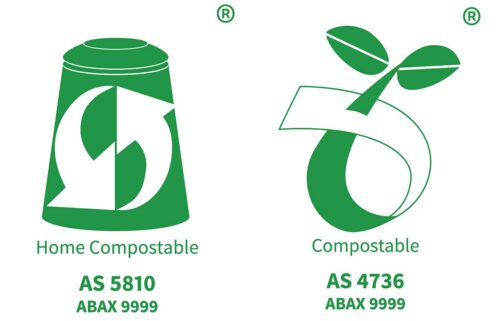
- AS 4736-2006
- AS 4736-2006 means Australian Standard 4736-2006 Biodegradable plastics - Biodegradable plastics suitable for composting and other microbial treatment published by Standards Australia.
- This standard is commonly known as "Industrial Compostability". Please note that items with this certification are not certified to biodegrade if littered or in landfill. They must be processed in commercial composting facilities.
- AS 5810-2010
- AS 5810-2010 means Australian Standard 5810-2010 Biodegradable plastics - Biodegradable plastics suitable for home composting published by Standards Australia.
- This standard is commonly known as "Home Compostability". These items can go in home compost bins or kerbside organics bins if approved by your local council.
.
Transitional exemption for EU certification
DWER has approved a class exemption for a limited amount of time for items which have achieved EU certification and/or have commenced AU certification, including:
- paperboard lined cups (no exemption for paperboard lined/coated cup lids)
- paperboard lined food containers and their paperboard lined lids
- paperboard lined bowls and their paperboard lined lids
- paperboard lined trays and their paperboard lined lids
- paperboard lined lids for plates (no exemption for paperboard lined/coated plates)
For example: this means that paperboard cups or bowls i.e. with compostable water dispersion or aqueous coatings - which have achieved EU certification OR commenced AU certification can be supplied/sold without the need to apply to the Department of Water and Environmental Regulation for an exemption.
If you plan to use this class exemption, you must notify the department by emailing: exemptions@dwer.gov.au
*Transitional exemption: DWER has approved a transitional, time-limited exemption for paperboard lined cups, containers and bowls which have achieved EU certification OR have commenced AU certification.
.
When considering national strategies or supplying outside WA, please be aware that rules around compostable plastics vary across current plastic bans.
.
Is my disposable plastic item a bowl, food container or cup?
- Bowl
- If it contains food and is round and is not supplied with a lid = it’s an unlidded bowl and was banned 1 July 2022.
- If it contains food and is round and has a lid = it's a lidded bowl which is banned 1 September 2024.
- Food container
- If it contains food and is NOT round and is not supplied with a lid = it’s an unlidded food container and was banned 1 July 2022.
- If it contains food and is NOT round and is supplied with a lid = it’s a lidded food container and is banned 1 September 2024.
- Cup
- If it contains a cold beverage = it’s a cup and was banned 1 October 2022.
- If it contains a hot beverage = it’s a cup and is banned 1 March 2024.
- All cup lids (whether for cold or hot drinks) are banned 1 March 2024.
- Beverages: Any room temperature, cold or frozen drink.
- Food: eg. icecream, chicken, mousse, chips, soup.
A lid is any enclosure which covers, protects or seals the items.
What is a "lid"?
- A lid is any enclosure which covers, protects, or seals the items.
- Includes rigid plastic lids, plastic windows, or lids or made of heat-sealed film. Does not include cling film.
Disposable plastic lids for cups are banned 1 March 2024.
The ban includes disposable cup lids made from any form of plastic, including compostable plastic and compostable plastic linings.
Cup lids must be completely plastic-free.
The ban does not apply to;
-
- uncoated/unlined all-fibre lids
- plastic cup lids used in a pre‑packaged product (arrives at store & remains pre-packaged)
Disposable plastic lids for takeaway food containers, bowls, plates, and trays are banned 1 September 2024.
The ban includes disposable cup lids made from any form of plastic, including those made purely from compostable plastic.
The ban does not apply to:
-
- plastic-lined paperboard lids certified to Australian composting standards AS 4736:2006 and/or AS 5810:2010
- plastic lids for pre-packed takeaway food (food that is packed in advance and placed on display to be selected by the customer later)
- eg. sandwich prepared in the morning, packed in a cardboard triangle with a plastic window, and then placed in display for customers to purchase it later.
- reusable container lids designed for washing and ongoing use.
If you are unsure whether your lid is banned, please contact the National Retail Association hotline before ordering.
Transition periods
- Passage date: The Stage 1 regulations passed into law on 1 January 2022, and the Stage 2 regulations passed into law on 1 March 2023. These dates are when it became an offence to provide false or misleading information about banned items.
- Enforcement dates: Banned items cannot be sold or supplied after the enforcement dates. For Stage 2 these are staggered for different items (see WHEN section above) to allow businesses enough time to use up excess stock and transition to compliant alternatives.
You cannot continue to supply banned stock in WA after the enforcement dates, even if you purchased it before those dates.
.
Have a plan
We recommend that businesses stop ordering banned items and transition to alternatives before the enforcement dates to avoid being left with unusable, excess stock.
- First consider if you really need disposable replacements or if you can move to reusable options.
- If you need disposable alternatives, contact your supplier to see if they are willing to exchange banned items for compliant alternatives. This is an opportunity for compliant suppliers to keep clients loyal while the risk of switching to another supplier is high.
- Order alternatives early to avoid issues such as lack of supply or shipping delays.
- Businesses which operate interstate may be able to transfer excess stock to another state (however be aware of bans in other states).
- Members of the public can still use banned items that they already own at home.
If you cannot exhaust, return, exchange or transfer your stock in time, you may like to contact a local recycler to see if they can take some items. Suggested Recyclers:
- Claw Environmental (Can recycle items with recycling symbol 2,5 & 6)
- Veolia (Can recycle items with recycling symbol 1,2 & 4)
.
IMPORTANT: Please be wary of rumours and false information suggesting there are "grace periods" for stock you purchased before the ban.
You cannot continue to supply banned stock in WA after the enforcement dates, even if you purchased it before those dates.
.
How will the ban be implemented and enforced?
The WA Plan for Plastics is being implemented by the WA Department of Water and Environmental Regulation (DWER).
From the enforcement dates, it will be an offence to do any of the following:
- sell or supply a banned plastic item
- provide false or misleading information about a banned plastic item
Fines of $5000 per offence apply.
DWER has engaged the National Retail Association (NRA) to help businesses learn more about the ban and how to comply.
IMPORTANT:
Please be aware that penalties apply from 1 January 2022 for providing false or misleading information about items. If a retailer purchases from a supplier based on reasonable evidence that they thought the items were compliant, the supplier will be investigated.
We recommend that all retailers ask suppliers to provide confirmation in writing that items are compliant. Similarly, we recommend that suppliers supplying items outside WA add details to online product listings or ask clients to confirm that they know the items are banned in certain jurisdictions.
If you suspect a prohibited plastic item is being supplied or sold, you can report this to DWER via (08) 6364 6651 or complianceforplastics@dwer.wa.gov.au
Distribution centres
Distribution centres supplying to customers outside WA are not included in the ban, though businesses should check for similar bans in other jurisdictions.
National suppliers can supply to clients outside of WA, but again please check local rules.
Single-use plastic bans around Australia
Most states and territories in Australia are implementing bans on single-use plastic items, though the rules of each ban vary per jurisdiction. Check the external links below for more information:
Download a summary of plastic bans across Australia and New Zealand >
Businesses can also call the National Retail Association hotline or email sustainability@nationalretail.org.au for information on other bans.
The WA Government and National Retail Association have collaboratively created a Comprehensive Guide for Business. This one-stop resource covers ALL existing and upcoming bans in Western Australia.
Need help understanding the ban and how it applies to your product range?
The National Retail Association are holding regular online Q&A sessions for businesses to pop in and ask questions of our expert team.

